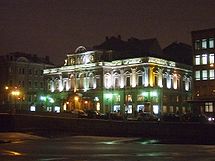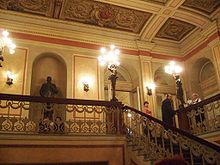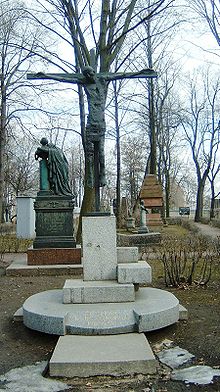- Tovstonogov Bolshoi Drama Theater
-
Tovstonogov Bolshoi Drama Theater 
Tovstonogov Theater at night, 2008.Address Fontanka Embankment City Saint Petersburg Country Russia Opened 1919 Previous names Gorky Bolshoi Drama Theater www.bdt.spb.ru/ Tovstonogov Bolshoi Drama Theater (Russian: Большой Драматический Театр имени Г. А. Товстоногова; literally Tovstonogov Great Drama Theater), formerly known as Gorky Bolshoi Drama Theater (Russian: Большой Драматический Театр имени Горького) (1931–1992), often referred to as the Bolshoi Drama Theater and by the acronym BDT (Russian: БДТ), is a theater in Saint Petersburg, that is considered one of the best Russian theaters[1]. The theater is named after its long time director Georgy Tovstonogov.
The theater is also encountered in literature as the Great Drama Theater or Great Dramatic Theater of Leningrad.
Contents
Background
The main people behind the establishment of the theater were Maxim Gorky, Maria Andreeva, Alexander Blok and Anatoly Lunacharsky.[2]
Already by 1914, before the October Revolution, actress Maria Andreeva —common law wife of Gorky from 1903 and Commissar for Theatres and Public Spectacles in Petrograd from 1918 to 1921— had participated in a theater initiative, including actor Yury Yuryev, with the aim of returning to the "classics". In 1918 Yuryev staged some works in Leningrad.
Gorky, Blok, Adreeva and Lunacharsky —who was People's Commissar of Enlightenment after the revolution— had similarly worked towards the aim of staging the classics for the masses. Eventually they merged with Andreeva's other endeavor.
In January 1919, the government sponsored the staging of Nikolai Gogol's The Government Inspector.
Early years
The theater was organized in 1918 by the order of Maria Andreeva. The original name of the theater was Osobaya Drammaticheskaya Truppa (Special Drama Company). The theater was organized by merging the Theater of Tragedy led by Yury Yuryev and the Theater of Art Drama led by Andrey Lavrentyev.
During the first year of its operation the theater performed on the stage of the Great Hall of the Petrograd Conservatory. The chief director of the theater was Andrey Lavrentyev and the Chairman was Alexander Blok. The first performance of the new theater was Friedrich Schiller's Don Carlos on 15 February 1919.[3] In 1920 the theater moved to the building, at 65 Fontanka Embankment, of the former Suvorin Theatre also known as Maly Imperial Drama Theater[1].
The main actors of that period were Yury Yuryev and Nikolay Monakhov. Many brilliant painters worked for the theater including Alexandre Benois, Mstislav Dobuzhinsky, Vladimir Shuko, Nikolay Akimov; among the composers working with the theater were Boris Asafiev and Yuri Shaporin. The theater produced mostly classical Romantic Dramas like: Don Carlos (1919), Othello (1920), King Lear (1920), Twelfth Night (1921), Ruy Blas (1921), The Robbers (1919), Le Médecin malgré lui, 1921, etc[3] Since mid 1920s the theater adds to its repertoire plays of German expressionists including Gas by Georg Kaiser, Virgin Forest by Ernst Toller and influenced by expressionism Machine Mutiny (Bunt Mashin) by Alexey Tolstoy.[3]
Konstantin Tverskoy (1925-1935)
The main director of that period was Konstantin Tverskoy (real name Konstantin Konstantinovich Kuzmin-Karavayev officially the Artistic Director in 1929-1935[4]). The theater was producing spectacles of Soviet drmaturgists, including Boris Lavrenev (Myatezh, 1925; Razlom), Vladimir Kirshon (Gorod Vetrov, 1928); Nikolai Pogodin (Moy drug, 1932)[3].
Very important were performances of Maxim Gorky plays including Yegor Bulychev and the others, 1932; Dostigaeyev and others, 1933[3]. In 1932 the theater was named in honor of Maxim Gorky. The theater was known as Gorky Bolshoi Drama Theater (Bolshoi Dramaticheskiy Teatr imeni Gor'kogo) until 1992, when it was renamed after Georgy Tovstonogov.
Difficult years (1935-1956)
The years after Tverskoy are considered to be a crisis for the theater. The leaders of the theater frequently changed, the level of performances lowered and the numbers of theater-goes dramatically decreased.[3]
The Artistic Directors (khudozhetvenniy rukovoditel) of that period were:
- V.F. Fyodorov - 1934;
- Aleksei Dikiy - 1936-1937;
- Boris Babochkin - 1939-1940;
- L.S. Rudnik - 1940-1944;
- N.S. Rashevskaya - 1946-1950;
- I.S. Yefremov - 1951-1952;
- O.G. Kaziko - 1952-1954;
- K.P. Khokhlov - 1954-1955;
During World War II the theater was evacuated to Kirov, Kirov Oblast. In 1943 in the last days of the Siege of Leningrad the theater returned to serve the troops of Leningrad Front and the military hospitals[3].
Georgy Tovstonogov (1956-1989)
Georgy Tovstonogov was the Artistic Director of the theater since 1956 until his death in 1989. During his prime Tovstonogov was considered one the best theatre directors of Europe and the theater was one of the best in the Soviet Union
Tovstonogov was the first who returned Fyodor Dostoyevsky into Soviet theater, by his productions of The Idiot (1957).
Among other famous performances are:
- The Three Sisters 1965 and Uncle Vanya (1982) by Anton Chekhov
- Five evenings 1958 and My big sister 1961 by Alexander Volodin
- Irkusk Story by A. N. Arbuzov 1960
- Wit Works Woe 1962 by Alexander Griboedov
- Barbarians (1959) and Meschane (1966) by Maxim Gorky
- Once again about Love (1964) by Edvard Radzinsky
- Henry IV (1969) by William Shakespeare
- Revisor by Nikolay Gogol (1972)
- Last summer in Chulimsk by Alexander Vampilov (1974)
- Energetic people by Vasily Shukshin (1974)
- History of a Horse after Leo Tolstoy's Kholstomer (1975)
and many others.
The prominent members of his troupe included Alisa Freindlich, Zinaida Sharko, Lyudmila Makarova, Tatiana Doronina, Svetlana Kryuchkova, Kirill Lavrov, Innokenty Smoktunovsky, Pavel Luspekaev, Yefim Kopelyan, Sergey Yursky, Vladislav Strzhelchik, Еvgeny Lebedev, and Oleg Basilashvili.
After Tovstonogov
In 1989, a prominent actor of the theater, Kirill Lavrov was unanimously elected the Artistic Director. He managed to preserve the artistic tradition established by Tovstonogov, and to rename BDT after Tovstonogov in 1993[3].
Lavrov did not acted as a theatrical director. Many spectacles of the period were directed by Temur Chkheidze. Among them were: Intrigue and Love by Friedrich Schiller (1990), Macbeth by William Shakespeare (1995); Antigone by Jean Anouilh (1996), Boris Godunov by Alexander Pushkin (1998)[3]
On 27 April 2007 Kirill Lavrov died and Temur Chkheidze was elected as the Artistic Director of BDT.[5]
Notes
References
- Clark, Katerina (1995). Petersburg, Crucible of Cultural Revolution. Harvard University Press. pp. 110–111. ISBN 0674663365.
- Senelick, Laurence (1999). "Theatre". In Rzhevsky,Nicholas. The Cambridge Companion to Modern Russian Culture. Cambridge University Press. pp. 276. ISBN 0521477999.
- Rudnitsky, Konstantin. Russian and Soviet Theatre—Tradition and the Avant-Garde. Thames and Hudson. pp. page 75. ISBN 0500281955.
- Von Geldern, James. Bolshevik Festivals, 1917-1920. Berkeley: University of California Press,1993.
- Kirillov, A.. "Tovstonogov Bolshoy Drama Theatre". http://www.encspb.ru/en/article.php?kod=2804032974. Retrieved 2008-07-11.
External links
- Official website (Russian)
Coordinates: 59°55′38″N 30°19′52″E / 59.927333343333°N 30.330994454444°E
Categories:- Theatres in Saint Petersburg
Wikimedia Foundation. 2010.



